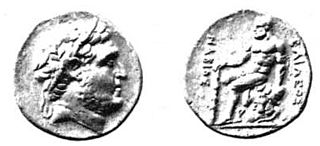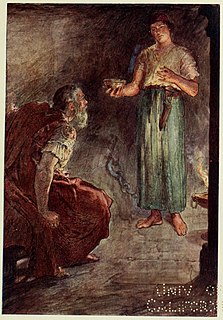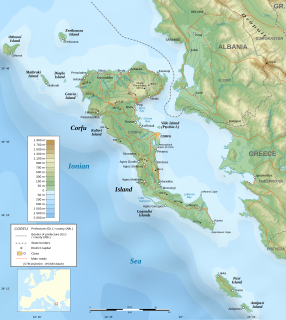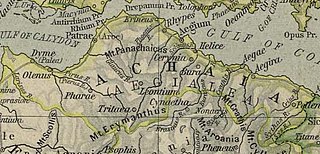Related Research Articles
This article concerns the period 199 BC – 190 BC.
Year 194 BC was a year of the pre-Julian Roman calendar. At the time it was known as the Year of the Consulship of Africanus and Longus. The denomination 194 BC for this year has been used since the early medieval period, when the Anno Domini calendar era became the prevalent method in Europe for naming years.
Year 192 BC was a year of the pre-Julian Roman calendar. At the time it was known as the Year of the Consulship of Flamininus and Ahenobarbus. The denomination 192 BC for this year has been used since the early medieval period, when the Anno Domini calendar era became the prevalent method in Europe for naming years.

Aetolia is a mountainous region of Greece on the north coast of the Gulf of Corinth, forming the eastern part of the modern regional unit of Aetolia-Acarnania.

Nabis was ruler of Sparta from 207 BC to 192 BC, during the years of the First and Second Macedonian Wars and the eponymous "War against Nabis", i.e. against him. After taking the throne by executing two claimants, he began rebuilding Sparta's power. During the Second Macedonian War, he sided with King Philip V of Macedon and in return he received the city of Argos. However, when the war began to turn against the Macedonians, he defected to Rome. After the war, the Romans, urged by the Achaean League, attacked Nabis and defeated him. He then was assassinated in 192 BC by the Aetolian League and was Sparta's last independent ruler. He represented the last phase of Sparta's reformist period.

Hellenistic Greece is the historical period of the country following Classical Greece, between the death of Alexander the Great in 323 BC and the annexation of the classical Greek Achaean League heartlands by the Roman Republic. This culminated at the Battle of Corinth in 146 BC, a crushing Roman victory in the Peloponnese that led to the destruction of Corinth and ushered in the period of Roman Greece. Hellenistic Greece's definitive end was with the Battle of Actium in 31 BC, when the future emperor Augustus defeated Greek Ptolemaic queen Cleopatra VII and Mark Antony, the next year taking over Alexandria, the last great center of Hellenistic Greece.

The Aetolian League was a confederation of tribal communities and cities in ancient Greece centered in Aetolia in central Greece. It was probably established during the early Hellenistic era, in opposition to Macedon and the Achaean League. Two annual meetings were held at Thermika and Panaetolika. The league occupied Delphi from 290 BC and steadily gained territory until, by the end of the 3rd century BC, it controlled the whole of central Greece with the exception of Attica and Boeotia. At its peak, the league's territory included Locris, Malis, Dolopes, parts of Thessaly, Phocis, and Acarnania. In the latter part of its power, certain Greek city-states joined the Aetolian League such as the Arcadian cities of Mantineia, Tegea, Phigalia and Kydonia on Crete.

Philopoemen was a skilled Greek general and statesman, who was Achaean strategos on eight occasions.

Aratus of Sicyon was a politician and military commander of Hellenistic Greece. He was elected strategos of the Achaean League 17 times, leading the League through numerous military campaigns including the Cleomenean War and the Social War.

The Aetolian War was fought between the Romans and their Achaean and Macedonian allies, and the Aetolian League and their allies the kingdom of Athamania. The Aetolians had invited Antiochus III the Great to Greece, who came, but after his defeat by the Romans returned to Asia. This left the Aetolians and the Athamanians without any allies. With Antiochus out of Europe the Romans and their allies attacked the Aetolians. After a year of fighting the Aetolians were defeated and forced to pay 1,000 talents of silver to the Romans.

The Laconian War of 195 BC was fought between the Greek city-state of Sparta and a coalition composed of Rome, the Achaean League, Pergamum, Rhodes, and Macedon.

The Seleucid War, also known as the War of Antiochos or the Syrian War, was a military conflict between two coalitions led by the Roman Republic and the Seleucid Empire. The fighting took place in modern day southern Greece, the Aegean Sea and Asia Minor.
Ariston may refer to:

The Social War, also War of the Allies and the Aetolian War, was fought from 220 BC to 217 BC between the Hellenic League under Philip V of Macedon and the Aetolian League, Sparta and Elis. It was ended with the Peace of Naupactus.
Scopas was an Aetolian general, who served both his native Aetolian League in the Social War and Ptolemaic Egypt against the Seleucids, with mixed success. He was executed in 196 BC at Alexandria for conspiring to seize the power of the realm for himself.
Pyrrhias was an Aetolian general, who was sent by his countrymen during the Social War, to take the command in Elis. Here he took advantage of the absence of Philip V of Macedon, and the incapacity of Eperatus the Achaean strategos, to make frequent incursions into the Achaean territories. Having established a fortified post on Mount Panachaikon, he laid waste the whole country as far as Rhion and Aigion. The next year he concerted a plan with Lycurgus, king of Sparta, for the invasion of Messenia. However, he failed in the execution of his part of the scheme, being repulsed by the Cyparissians before he could effect a junction with Lycurgus. In consequence he returned to Elis, but as the Eleans were dissatisfied with his conduct, he was shortly after recalled by the Aetolians and replaced by Euripidas. At a later period he obtained the office of strategos of the Aetolians, in the same year that this office was bestowed as an honorary title upon Attalus I, king of Pergamon. In the spring of that year he advanced with an army to Lamia to oppose the passage of Philip V of Macedon towards the Peloponnese. Though supported with an auxiliary force both by Attalus and by the Roman praetor Publius Sulpicius Galba Maximus, he was defeated by Philip in two successive battles and forced to retire within the walls of Lamia. It is not improbable that Sipyrrhicas, who appears in Livy (XXXI.46) as chief of the Aetolian deputation which met Attalus at Heracleia, is only a false reading for Pyrrhias.

The Battle of Paxos was a naval battle between a coalition of Illyrian federation with their Acarnanian allies, against the allies of Corcyra, the Achaean League and Aetolian League. The battle took place in the spring of 229 BC and was a direct consequence to the siege of Corcyra by the forces of queen Teuta.

The Battle of Leontion in 217 BC was the last battle of the Social War fought between the Achaean League and the Aetolian League. The battle is mentioned by the historian Polybius and by the Achaean poet Damagetus, who calls it the "Battle at the Achaean Trench".

The Lyttian War was an internal conflict fought from around 220 BC to about 216 BC between two coalitions of Cretan city-states, led by Cnossus and Polyrrhenia respectively. The events of the war are recorded by the historian Polybius. It is considered "the greatest war in Cretan history" during Antiquity.
References
![]() This article incorporates text from a publication now in the public domain : Schmitz, Leonhard (1870). "Ariston". In Smith, William (ed.). Dictionary of Greek and Roman Biography and Mythology . 1. p. 309.
This article incorporates text from a publication now in the public domain : Schmitz, Leonhard (1870). "Ariston". In Smith, William (ed.). Dictionary of Greek and Roman Biography and Mythology . 1. p. 309.